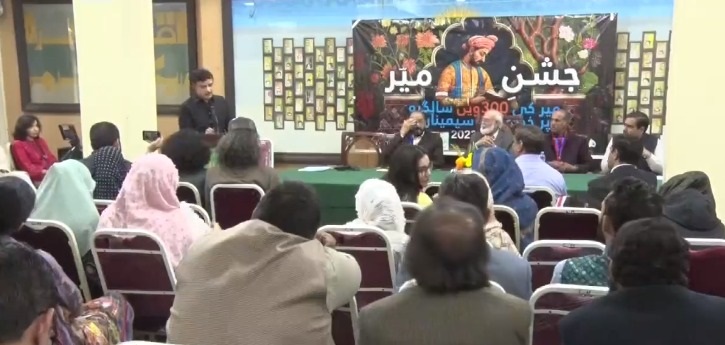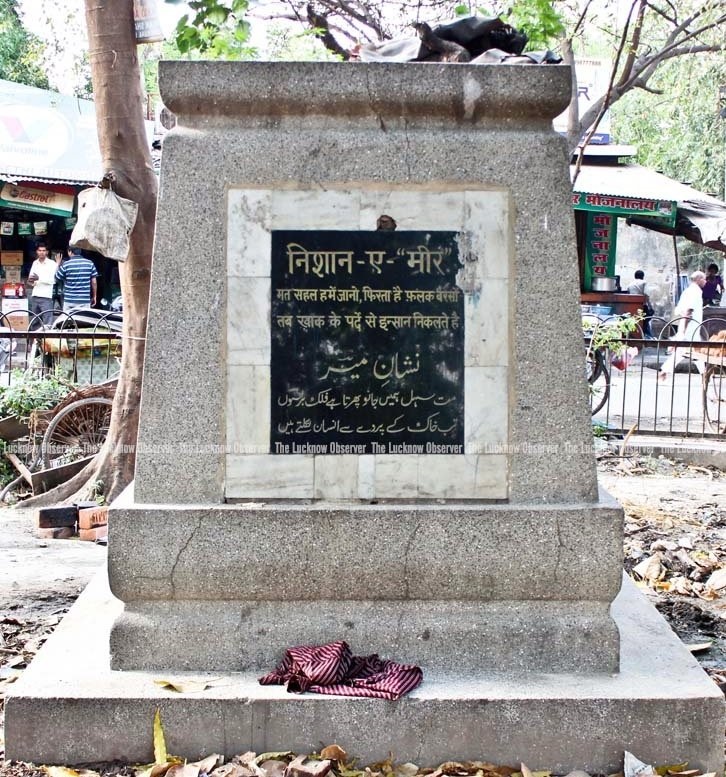Written by: Haroon Shuaib
Posted on: March 09, 2023 |  | 中文
| 中文
Mir Taqi Mir
On March 3, 2023, ‘Hum Sukhan”, a collective of writers, poets, and literature patrons organized a special literary gathering at “Acadamy Adbiyat Pakistan” (Pakistan Academy of Letters), to commemorate the third centenary of the birth of one of the earliest and greatest poets of Urdu, Mir Taqi Mir. The Academy of Letters has the mandate to publish literary and related works and promote authorship and literary exchanges. It is widely believed that literature, particularly Urdu poetry, is not as popular nowadays as it was a few decades ago, the gathering was well attended by the literary enthusiasts and admirers of Mir Taqi Mir, the 18th-century poet who is known as one of the earliest exponents of Urdu ghazal. Prominent literary minds of the country such as Adnan Bashir, Sajid Siddique Nizami, Dr. Shahab Uddin Saqib, Akhtar Usman, Ahmed Javed, Najiba Arif, Aziz Ibnul Hassan and Zaif Syed read their papers on different facets of Mir Taqi Mir, including his personality, his Urdu and Persian poetry, his style of Mathnawi (also written as Masnavi), and his influence on Urdu literature to the present times.

Jashan-e-Mir was organized at Pakistan Academy of Letters to commemorate the poetic genius of Mir Taqi Mir on his 300th birth day
A book authored by Dr, Shahab Uddin Saqib, a professor of Urdu at the Centre for Advanced Studies at the Aligarh University, titled “Mir’s contributions to Persian Literature”, was also launched at the event. Interestingly, Mir Taqi Mir in his Urdu and Persian poetry has penned many verses with the same meaning in Urdu, as well as in Persian. Many poets and writers attended the event online, including Professor Shahab. Dr. Sanobar Altaf moderated the event, which was presided over by Tehseen Firaqi. The event culminated in a musical recital of Mir Taqi Mir’s choicest five ghazals, sung by Ali Shah Khan.
Mir Taqi Mir, also known as “Khuda-e-Sukhan” (Deity of Words), was different from many other poets of Urdu, and most of his verses were addressed to the world rather than an individual. Born in the city of Agra in 1723, he is rightly considered one of the pioneers who gave shape to the Urdu language, and particularly the medium of ghazal poetry. His father's name was Meer Muttaqi, who passed away when Mir was still in his formative years. After his father's death, his step-brothers took control of his property. His step-uncle took care of him after he was orphaned, and after the death of his step-uncle (paternal), his maternal step-uncle took care of him. The difficult childhood left a lasting impact on Mir’s psychology and we get many glimpses of it in his verses as he appears frustrated, melancholic, and full of pain in his poetry, such as in this verse:
“Ashk aankhon mein kab nahin aata?
Lahu aata hai jab nahin aata”
(From my eye, when doesn't a tear fall? Blood falls when it doesn't fall)
From Agra, he moved to Delhi as a young man. This was a time when the Mughal dynasty had lost its former glory, and British colonialism was in the process of establishing itself in the Indian subcontinent. Other invaders from outside the subcontinent were also constantly posing a threat to Delhi. He was considered one of the principal poets of the Delhi School of the Urdu ghazal, and witnessed the destruction of the once magnificent seat of power at the hands of Ahmed Shah Abdali. It left a lasting impression on the poet. He spent the latter part of his life in the court of Asaf-ud-Daulah in Lucknow, where he had moved in 1782. The people of Lucknow city were very appreciative of the great poet. This is when he wrote,
“Dilli jo aik Shehar tha, aalam main intikhab
Hum rehnay walay hain ussi ujray diyar kay”
(Delhi which was once the choicest city in the world, we belong to that same land that stands destroyed today.)

Nishan-e-Mir in Lucknow, a mark to recognize the great poet who spent the last part of his life in the city
Mir's relationships with his patron gradually grew strained and he eventually severed his connections with the court. Mir was very isolated in his last years. His health was failing and the untimely deaths of his daughter, son and wife left him in a state of sorrow. Besides his vast body of poetic works in Urdu and Persian, Mir has also left behind an autobiography, ‘Zikr-e-Mir’, which is an important source of information on his life and times. Mir passed away in 1810 at the ripe old age of eighty-seven in Lucknow, and the melancholic poet was finally laid to rest. He summed up the sadness of his life in this couplet:
“Sarhanay Mir Kay aahista bolo
Abhi tuk rotay rotay sou gaya hay”
(Speak in a hushed tone on Mir’s bedside, he cried himself to sleep)
Mir in his own time was also very influential as a poet who was leading the wave of the formation of a new language, Urdu, and also strengthening the tradition of poetry in this new emerging etymology which at that stage was called “Rekhta”.
Ghalib, the greatest Urdu poet ever was Mir's contemporary, as were other poetic giants of Urdu, such as Mirza Rafi Sauda and Ibrahim Zauq. Many say that the difference between Ghalib and Mir remains that while Mir’s sensitive nature and challenges made him disconsolate, Ghalib never lost his sense of humor despite the difficulties and heartbreaks he faced in his own life. While the jury is still out as to who is the most consequential poet in the formation of the Urdu language as we know it today, Ghalib himself addressed this matter in this verse:
“Reekhta kay tumhain Ustad nahin ho Ghalib
Kehte hain aglay zamane mein koi Mir bhi tha”
(You are not the only master of Rekhta, Ghalib, they say there used to be a Mir in the past)
The history of Urdu poetry shall forever remain incomplete without a mention of Mir and his influence on Urdu Ghazal. His contribution to the Urdu language in its formative phase remains vital to this day. It was undoubtedly befitting that the poets and writers from across the country got together to pay homage to, and celebrate the work and life of this poetic genius. Pakistan Academy of Letters and Hum Sukhan group, deserve a special commendation for arranging this befitting tribute.
You may also like: